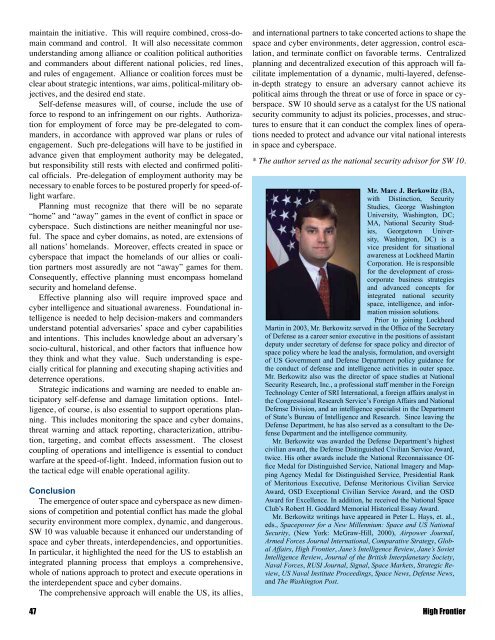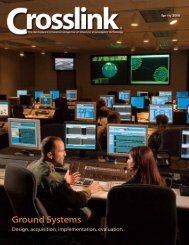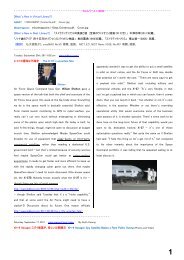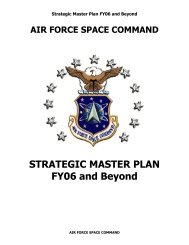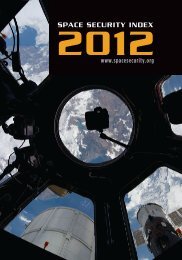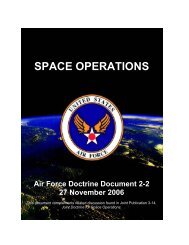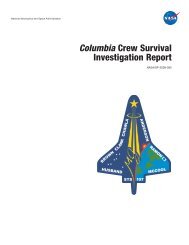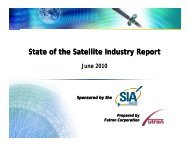Schriever Wargame 2010 - Air Force Space Command
Schriever Wargame 2010 - Air Force Space Command
Schriever Wargame 2010 - Air Force Space Command
Create successful ePaper yourself
Turn your PDF publications into a flip-book with our unique Google optimized e-Paper software.
maintain the initiative. This will require combined, cross-domain<br />
command and control. It will also necessitate common<br />
understanding among alliance or coalition political authorities<br />
and commanders about different national policies, red lines,<br />
and rules of engagement. Alliance or coalition forces must be<br />
clear about strategic intentions, war aims, political-military objectives,<br />
and the desired end state.<br />
Self-defense measures will, of course, include the use of<br />
force to respond to an infringement on our rights. Authorization<br />
for employment of force may be pre-delegated to commanders,<br />
in accordance with approved war plans or rules of<br />
engagement. Such pre-delegations will have to be justified in<br />
advance given that employment authority may be delegated,<br />
but responsibility still rests with elected and confirmed political<br />
officials. Pre-delegation of employment authority may be<br />
necessary to enable forces to be postured properly for speed-oflight<br />
warfare.<br />
Planning must recognize that there will be no separate<br />
“home” and “away” games in the event of conflict in space or<br />
cyberspace. Such distinctions are neither meaningful nor useful.<br />
The space and cyber domains, as noted, are extensions of<br />
all nations’ homelands. Moreover, effects created in space or<br />
cyberspace that impact the homelands of our allies or coalition<br />
partners most assuredly are not “away” games for them.<br />
Consequently, effective planning must encompass homeland<br />
security and homeland defense.<br />
Effective planning also will require improved space and<br />
cyber intelligence and situational awareness. Foundational intelligence<br />
is needed to help decision-makers and commanders<br />
understand potential adversaries’ space and cyber capabilities<br />
and intentions. This includes knowledge about an adversary’s<br />
socio-cultural, historical, and other factors that influence how<br />
they think and what they value. Such understanding is especially<br />
critical for planning and executing shaping activities and<br />
deterrence operations.<br />
Strategic indications and warning are needed to enable anticipatory<br />
self-defense and damage limitation options. Intelligence,<br />
of course, is also essential to support operations planning.<br />
This includes monitoring the space and cyber domains,<br />
threat warning and attack reporting, characterization, attribution,<br />
targeting, and combat effects assessment. The closest<br />
coupling of operations and intelligence is essential to conduct<br />
warfare at the speed-of-light. Indeed, information fusion out to<br />
the tactical edge will enable operational agility.<br />
Conclusion<br />
The emergence of outer space and cyberspace as new dimensions<br />
of competition and potential conflict has made the global<br />
security environment more complex, dynamic, and dangerous.<br />
SW 10 was valuable because it enhanced our understanding of<br />
space and cyber threats, interdependencies, and opportunities.<br />
In particular, it highlighted the need for the US to establish an<br />
integrated planning process that employs a comprehensive,<br />
whole of nations approach to protect and execute operations in<br />
the interdependent space and cyber domains.<br />
The comprehensive approach will enable the US, its allies,<br />
and international partners to take concerted actions to shape the<br />
space and cyber environments, deter aggression, control escalation,<br />
and terminate conflict on favorable terms. Centralized<br />
planning and decentralized execution of this approach will facilitate<br />
implementation of a dynamic, multi-layered, defensein-depth<br />
strategy to ensure an adversary cannot achieve its<br />
political aims through the threat or use of force in space or cyberspace.<br />
SW 10 should serve as a catalyst for the US national<br />
security community to adjust its policies, processes, and structures<br />
to ensure that it can conduct the complex lines of operations<br />
needed to protect and advance our vital national interests<br />
in space and cyberspace.<br />
* The author served as the national security advisor for SW 10.<br />
Mr. Marc J. Berkowitz (BA,<br />
with Distinction, Security<br />
Studies, George Washington<br />
University, Washington, DC;<br />
MA, National Security Studies,<br />
Georgetown University,<br />
Washington, DC) is a<br />
vice president for situational<br />
awareness at Lockheed Martin<br />
Corporation. He is responsible<br />
for the development of crosscorporate<br />
business strategies<br />
and advanced concepts for<br />
integrated national security<br />
space, intelligence, and information<br />
mission solutions.<br />
Prior to joining Lockheed<br />
Martin in 2003, Mr. Berkowitz served in the Office of the Secretary<br />
of Defense as a career senior executive in the positions of assistant<br />
deputy under secretary of defense for space policy and director of<br />
space policy where he lead the analysis, formulation, and oversight<br />
of US Government and Defense Department policy guidance for<br />
the conduct of defense and intelligence activities in outer space.<br />
Mr. Berkowitz also was the director of space studies at National<br />
Security Research, Inc., a professional staff member in the Foreign<br />
Technology Center of SRI International, a foreign affairs analyst in<br />
the Congressional Research Service’s Foreign Affairs and National<br />
Defense Division, and an intelligence specialist in the Department<br />
of State’s Bureau of Intelligence and Research. Since leaving the<br />
Defense Department, he has also served as a consultant to the Defense<br />
Department and the intelligence community.<br />
Mr. Berkowitz was awarded the Defense Department’s highest<br />
civilian award, the Defense Distinguished Civilian Service Award,<br />
twice. His other awards include the National Reconnaissance Office<br />
Medal for Distinguished Service, National Imagery and Mapping<br />
Agency Medal for Distinguished Service, Presidential Rank<br />
of Meritorious Executive, Defense Meritorious Civilian Service<br />
Award, OSD Exceptional Civilian Service Award, and the OSD<br />
Award for Excellence. In addition, he received the National <strong>Space</strong><br />
Club’s Robert H. Goddard Memorial Historical Essay Award.<br />
Mr. Berkowitz writings have appeared in Peter L. Hays, et. al.,<br />
eds., <strong>Space</strong>power for a New Millennium: <strong>Space</strong> and US National<br />
Security, (New York: McGraw-Hill, 2000), <strong>Air</strong>power Journal,<br />
Armed <strong>Force</strong>s Journal International, Comparative Strategy, Global<br />
Affairs, High Frontier, Jane’s Intelligence Review, Jane’s Soviet<br />
Intelligence Review, Journal of the British Interplanetary Society,<br />
Naval <strong>Force</strong>s, RUSI Journal, Signal, <strong>Space</strong> Markets, Strategic Review,<br />
US Naval Institute Proceedings, <strong>Space</strong> News, Defense News,<br />
and The Washington Post.<br />
47 High Frontier


